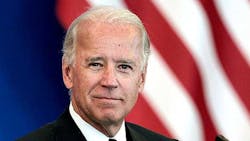Biden Urges End to 'Outright' Theft by China
WASHINGTON – U.S. Vice President Joe Biden urged China on Wednesday to end its "outright" theft through hacking as the world's two largest economies waded into some of their thorniest disputes.
Biden opened two days of annual talks with China in which the Pacific powers pledged to build trust but are addressing a gamut of issues including mutual complaints over market access.
While many experts expect the session to be a talking shop without major decisions, Biden did not shy away from divisive rows including charges of cyber-espionage.
"We both will benefit from an open, secure, reliable Internet. Outright cyber-enabling theft that U.S. companies are experiencing now must be viewed as out of bounds and needs to stop," Biden said.
A recent U.S. study said that corporate America was losing hundreds of billions of dollars a year through a vast, organized hacking campaign to steal U.S. trade, government and military secrets.
China has hit back that it is also the victim of hacking, charges that gained momentum when U.S. intelligence leaker Edward Snowden said that U.S. spies had broken into the billion-plus nation's Internet routing network.
Biden brought up China's tense territorial disputes with its neighbors, saying that both Pacific powers "benefit from freedom of navigation and uninhibited lawful commerce."
He also raised concerns about human rights, days after Chinese troops were reported to open fire on Tibetans celebrating the birthday of their exiled spiritual leader the Dalai Lama.
"I believe that China -- presumptuous of me -- ... will be stronger and more stable and more innovative if it represents and respects the international human rights norms. But there are differences we have," Biden said.
State Councilor Yang Jiechi, a top figure behind China's foreign policy, told the talks that Beijing was ready to discuss human rights but "on the basis of equality and mutual respect."
But both U.S. and Chinese officials sought to keep an upbeat tone, voicing hope that the two nations can keep building trust following a friendly, informal summit last month between U.S. President Barack Obama and his new Chinese counterpart Xi Jinping.
"Mistrust and Suspicion"
Biden warned that "strong voices on both sides of the Pacific" see ties between the United States and a rising China "in terms of mistrust and suspicion."
"I've heard the U.S.-China relationship described as everything from the next Cold War to the new G-2 and, the truth is, neither are accurate," Biden said.
"Our relationship is and will continue to be, God willing, a mix of competition and cooperation. And competition can be good for both of us, and cooperation is essential," he said.
Yang called China a "responsible" country that has worked with the United States on the international financial crisis and in the "fight against terrorism."
"There are many common interests between us, as well as some friction and difficulties. However, our common interests far outweigh our differences," he said.
Lawmakers Call for Greater Market Access
Ahead of the talks, known as the Strategic and Economic Dialogue, four top U.S. lawmakers on trade policy made a joint call for China to do more to open its market and protect intellectual property.
The lawmakers, two from Obama's Democratic Party and two from the rival Republican Party, said that China had failed to carry out promises from previous years such as phasing out pirated software from all government offices.
Treasury Secretary Jacob Lew was more diplomatic at the start of the talks. He welcomed commitments made by the billion-plus nation and said he "will encourage China to follow through decisively."
Secretary of State John Kerry, who was supposed to be a main participant, attended only the opening session so he could return to Boston where his wife, Teresa Heinz Kerry, has been hospitalized following seizure-like symptoms.
Kerry, who choked back tears as he voiced hope that his wife was getting better, is being replaced by his deputy, veteran diplomat William Burns.
Under Kerry's influence, the talks focused heavily on climate change. The two sides agreed to come up with plans by October on five goals including reducing emissions from heavy-duty vehicles and improving data collection on greenhouse gases.
At the summit last month with Obama, Xi threw China's support behind efforts to phase out hydrofluorocarbons, the ultra-pollutant gases found in air conditioners and refrigerators.
Copyright Agence France-Presse, 2013
About the Author
Agence France-Presse
Copyright Agence France-Presse, 2002-2025. AFP text, photos, graphics and logos shall not be reproduced, published, broadcast, rewritten for broadcast or publication or redistributed directly or indirectly in any medium. AFP shall not be held liable for any delays, inaccuracies, errors or omissions in any AFP content, or for any actions taken in consequence.
